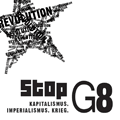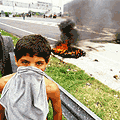 |




 Call as PDF (139 KB) Call as PDF (139 KB)
 Aufruf in Deutsch Aufruf in Deutsch
 Llamamiento en español Llamamiento en español
 Appello in italiano Appello in italiano
 Appel en français Appel en français |
 |
 |
Stop G8. Capitalism. Imperialism. War.
Anti-G8-Alliance for a revolutionary perspective  20. März 2006
20. März 2006
Against the G8 summit in 2007 in Heiligendamm!
In the summer of 2007, the heads of state of Germany, Italy, France, Russia,
Great Britain, Japan, Canada and the USA will meet for the so-called G8 summit
in Heiligendamm in Mecklenburg-Western Pomerania in north-east Germany. They
will be well protected by police and the military, and they want to demonstrate
their unity to the media. They will try to present themselves as the legitimate
leadership of the “civilized world” and will organize to implement
their common interests. Contrary to their actual policy they will again feign
commitment to fighting world hunger, disease, poverty and terrorism. Just like
at past summits, tens of thousands will protest against the meeting to show the
real meaning of the G8.
G8 – peace, freedom and democracy?
The G8 summit will take place in a political situation in which the contradictions
are growing in Germany as in the other G8 states. There are increasingly far-reaching
attacks on the standard of living of the working class in the form of repressive
laws and cuts in wages, in the social systems and in retirement plans. More and
more people are forced into unemployment, precarious employment or low-paid jobs.
Already millions of people live under the poverty line – even full-time
employment no longer guarantees the former standard of living. At the same time
privatization leads to a clear deterioration in standards for workers in this
sector as well as for the general population, who pay higher prices for fewer
services. Steadily rising costs for rent, heating, water and electricity, as
well as the discontinuation of many previously guaranteed services in the health
care system and in education are the concrete results. Women are especially affected
by these cuts, as they are in a worse position in many sectors and the cuts have
an especially dramatic effect on them. Because of the legal regulations from
the “Hartz” laws, many women get no social support because their
life partners’ income is calculated as their own – this is only
one of many examples. Also many immigrants, as a part of the lower classes of
society, are affected even more drastically by these developments, and as soon
as they are no longer useful for the economy, they are threatened by massive
state discrimination and deportation. In addition, they are held up as scapegoats
for the worsening situation and are exposed to social prejudices, exclusions
and attacks. However, in the end, it is characteristic of the current attacks
that they no longer affect only the marginalized social groups, but the majority
of the population. Consequently more protest and resistance is appearing against
these attacks in the form of mass demonstrations and strikes.
The offensive of capital takes place not only on a national level, but affects
people in all parts of the world. The imperialist states have always used every
means possible to forward their interests worldwide – with wars, economic
sanctions or the installation or the logistical and military support of regimes
faithful to them. Thus nowadays the G8 states are involved directly in imperialist
wars, arm to prepare themselves for the next wars, or take part by supplying
arms to conflict regions. A bitter irony is that they are currently fighting
wars in Afghanistan and Iraq, against brutal regimes they once installed and
supported themselves – as long as they profited from them. The victim
is, in any case, the majority of the population.
With the help of institutions like the IMF, the World Bank or the WTO, with
commercial agreements like GATS and with direct influence on the regimes in different
countries, they secure worldwide access to cheap raw materials and manpower for
themselves – at the expense of the population in the affected countries.
Millions of people are forced into brutal exploitation in sweat shops, in Eastern
Europe, Asia, and Africa, or the foundations of their survival are destroyed
by the pillaging of raw materials available there. The dam projects in India,
which led to devastating poverty and masses of refugees, or the structural adjustment
programs in Argentina, which led to a wave of impoverishment, are only two of
countless examples worldwide which demonstrate the direct results of the policies
of the IMF and the World Bank.
The resistance of the affected people – whether against the military
attacks, inhuman working conditions or the theft of natural resources – is
suppressed either directly by the thugs of the big companies or by the regimes
which are financed and equipped by the big companies, with their state apparatus:
the police, the secret services and the military.
This work of capital or its representatives is an expression of increasing
competition between big companies and the countries in which they are based,
as well as increasing difficulties in further raising profits. To solve this
crisis they attempt to increase exploitation and to lower the expenditures in
social areas, to reshape all social relations according to the interests of capital
and to secure markets worldwide – as these are divided up, the competition
must increase.
The G8 summit was brought to life to defuse the inner-imperialist contradictions – specifically,
for example, the customs disputes between the EU and the USA or the currency
competition between the euro and the dollar – and to mark out, if
necessary, the respective zones of influence. At the same time it serves to standardize
strategies for exploitation and decide on measures to prevent uprisings, and
to present these in propaganda as “necessary” or even “in
the interest everyone”.
Those who don’t fight have already lost!
There are more than enough good reasons to use the opportunity provided by
the G8 summit to demonstrate against the policies of the ruling class, whose
mightiest political representatives meet there, and to bring protest and resistance
against the summit out onto the streets. The mobilization must be led by those
who are affected by social cuts and “Hartz” laws, privatization,
wage cuts, lengthening of the working week, racist discrimination or sexist oppression
and who have, therefore, an interest in changing things. However, it must also
be a platform for the advanced and revolutionary movements in all parts of the
world to present their struggles in the capitalist metropolises: against capitalist
exploitation and impoverishment of big parts of the world population in the affected
countries, against the imperialistic plundering of national resources, against
expulsion, occupation and war, against the attacks of the oligarchy. Hence, the
dialogue with the liberation movements and their long experiences must also serve
to develop strategies against the common imperialist enemy. Here the resistance
against the capitalist offensive must stand in solidarity with the different
progressive and revolutionary movements worldwide to coordinate common actions
and to develop common perspectives.
From resistance to a perspective!
Protest and resistance cannot only be directed against the symptoms of the
policies of the leading capitalist states. If we want to change the situation,
we must analyze and understand it.
The foundations of the concrete policies of the G8 states are the foundations
of the capitalistic system. These foundations are based on exploitation, competition
and ownership of the means of production by a minority which holds power in society.
On this basis there can be no real steps towards emancipation, because the rights
and needs of people and the preservation of the environment are subordinated
to the profit system. All appeals to the profiteers and managers of this system,
appeals for a more social version of this system, appeals for at least minimum
concessions have proven hopeless – the current worsening of the situation
makes them more hopeless than ever.
The current developments also make it clear that the capitalist system with
its exploitation and repression always produces the means to overcome it: the
inner logic of capitalism and the supposed weakness of the exploited lead to
increasing fierceness of the “class struggle from above” in the capitalist
metropolises, which means that the question of real alternatives is posed for
the people affected.
In this situation it’s obvious that the reformist policies of the social
democracy and the trade union leaderships, which aim for a compromise between
the classes, lead in this situation to a dead-end, or they position themselves
openly on the capitalists’ side and begin to lose their integrative role.
Based on this development, the possibility of an actual transformation of social
relations towards a liberated society makes itself real. The appearance of new,
mass protest movements, strikes and attempts of different forms of organization
are the first signs for the fact that the times when there was a consensus in
the G8 states and the social contradictions were exported are coming to an end.
Besides the conflict zones in different parts of the world, where the revolutionary
movements and organizations have built on decades of experience, from Nepal via
India, Colombia and the Philippines to Mexico, capital finds itself in an objectively
precarious situation in the metropolises as well, and the tendency is for this
to increase. The preemptive internal armament and the ever more brutal methods
against social protests, sometimes by attacks in the bourgeois media, sometimes
by (supposed) offers of integration, sometimes by crude police actions, already
show how this problem is to be solved. However, the results of the relatively
small strikes in the car industry, at airports or in the civil service at least
give an idea of the power of the class of the wage-earners, and of what the results
of even bigger and better-organised workers’ struggles or even a general
strike could have. Also the struggles in other parts of the world, like the factory
occupations in Argentina, mass protests and riots in France against the attacks
on protections against dismissal, the guerrilla struggles and militant and political
general strikes in Nepal or the countless other labour struggles show which forms
of struggle are possible as an answer to the attacks of capital – and
also must be developed here.
But for this it is necessary to bring the isolated protests, resistance and
workers’ struggles again onto a political plane: to recognize the capitalist
system as a cause of these developments and to strive for its overthrow. The
fact that the revolutionary forces are so weak after many mistakes and defeats,
especially in Germany, that they currently have almost no political influence
to intervene in current developments, presents this necessity all the more urgently.
Together with racist attacks against migrants, “public opinion” is
to be mobilized in a social-chauvinistic to preemptively split a possible common
resistance of all affected persons.
Mobilizations like the one against the G8 summit can be an occasion to unite
ourselves, to conduct discussions and gain experience. They can be used to explain
criticisms of the dominant social relations and the necessity of a revolutionary
transformation of these relations, as well as to bring together existing structures
and thus to strengthen them. Decisive is what develops from this. Only by a continuous
organizing process of the revolutionary forces on different levels, the development
of a sound theory and practice, can capitalism really be overthrown and a liberated
social order created. The current, temporary protests and movements must be used
as an impulse for an engaging organization, to develop from resistance to a broader
perspective.
Get involved in the Anti-G8-Alliance for a revolutionary perspective!
We want to use the mobilization against the G8, in a situation of increasing
contradictions, to connect the defensive struggle against the current attack
at home as well as globally with the fight for a liberated social order. The
meaning of the mobilization for us is more than making revolutionary theory and
practice visible, but also to organize common engaging structures which will
continue beyond the G8 summit.
We start with the assumption that the G8 summit offers an important opportunity
for the revolutionary, class-struggle-oriented and internationalist left precisely
in the current situation. A successful mobilization could be the starting point
for a revolutionary movement and for revolutionary organizing which would once
again become stronger in Germany.
Moreover, it is our opinion that it is necessary to work on the basis of basic
positions and clear demands which are directed against capital’s central
points of aggression:
- Resistance against the general offensive of capital at home!
- For class struggle in workplaces, schools and universities, against social
cuts, longer working hours, wage and pension cuts!
- Against the Lisbon Agenda, the Bolkestein directive, the further flexibilisation
of services and working conditions!
- No imperialist war and occupation! No war against Iran! Immediate withdrawal
of the occupying troops from Iraq, Afghanistan and Palestine! No to Plan Colombia!
No to Plan Patriota!
- Solidarity with all revolutionary and emancipatory forces and their struggle
against imperialism.
- Fight against all reactionary and dehumanising positions! Fight against racism,
patriarchy, anti-Semitism and Islam-phobia.
- No to IMF, World Bank, WTO and GATS! Cancellation of all debts of the countries
of the Tricont held by the imperialist states and their institutions!
- No to the imperialist EU! No European army and battle groups! No to worldwide
military interventions or and domestic interventions!
- No racism and national oppression! No to fortress Europe! For open borders!
Against all restrictions on entry and residence! Equal rights for all!
- Against the destructive exploitation of nature and the environment!
- Freedom for all political prisoners worldwide! No to the so-called “anti
terror laws” and black lists! Resistance is not terrorism!
Starting with these basic positions, ideas and demands, we want to build up our
alliance, mobilize against the G8 summit and develop a constructive collaboration
with all alliances, organizations of the left and the rank-and-file groups of
the trade unions.
Groups of the Anti-G8-Alliance: Autonome Kommunisten Berlin,
Breites Bündnis für Kolumbien, Gegeninformationsbüro Berlin, Gruppe
Arbeitermacht, Gruppe Internationale Solidarität Magdeburg, Initiativ e.V.
Duisburg, Revolution, Rote Aktion Berlin, Roter Oktober, Solidaritätsgruppe
Oihuka, Sozialforum Hamburg-Eimsbüttel, Trotz Alledem
Supporters of the call: Autonome Antifa Finsterwalde, Internationalistischer
Abend Berlin, Netzwerk Freiheit für alle politischen Gefangenen, Netzwerk
Linke Opposition Berlin, Revolutionäre Aktion Stuttgart, Revolutionär
Sozialistischer Bund (Berlin), Volkswiderstandsbewegung der Welt (Ortsgruppe
Berlin)
Stop G8. Capitalism. Imperialism. War.
Anti-G8-Alliance for a revolutionary perspective
www.antiG8.tk
 Call as PDF (139 KB) Call as PDF (139 KB)
 Aufruf in Deutsch Aufruf in Deutsch
 Llamamiento en español Llamamiento en español
 Appello in italiano Appello in italiano
 Appel en français Appel en français |
 |
 |